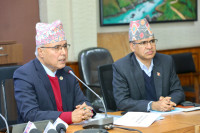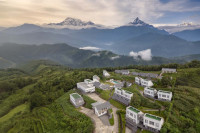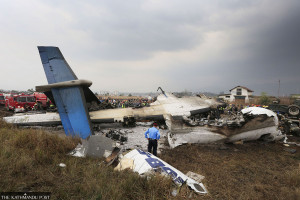Money
Nepal’s banking industry is a leader in South Asia in employing women
They make up 45 percent of financial service staff, but much less in senior positions.
Krishana Prasain
After completing her MBA, Devna applied for jobs in the banking industry and found an exciting role.
However, the interview had turned a little uncomfortable when her prospective manager asked about her plans for marriage and motherhood.
She was assigned to a branch.
In the beginning, Devna lived alone and spent long hours at work. She felt her work-life balance could have been better and she was also concerned for her safety when travelling late.
However, her big ambitions in the banking sector kept her motivated.
After marriage, she moved in with her in-laws and her ability to work late changed drastically. She now rushed home after the close of business to be with her daughter, care for her ageing in-laws and manage household chores.
Devna’s work continued to be impeccable though.
However, lack of support from colleagues and increasing chores at home affected her morale. She was unable to travel often as her daughter was still young. This in turn affected her annual appraisal. Additionally, unclear and inadequate feedback meant she could not improve.
On some days, Devna wanted to take time off to be with her daughter, finish pending chores, and relax. But her manager was reluctant to approve these short breaks. Many colleagues warned her that taking leave would make her seem “less committed” than her peers. She soldiered on, even when she was burnt out.
She was eventually promoted to middle management—years behind her male peers.
New challenges soon emerged. Previously, she was interrupted when speaking during team meetings. Now, she also felt disrespected by her subordinates.
Devna’s plight is perhaps emblematic of most Nepali women working in the finance sector.
***
Despite social challenges in the patriarchal society, Nepal’s banking industry is a leader in South Asia when it comes to women’s representation in commercial banks’ workforce, according to a report published on Wednesday.
Women constitute 45 percent of employees in the financial services industry in Nepal, against a regional average of 20 percent, said the report titled ‘Women’s Advancement in Banking in Emerging South Asian Countries’, the first of its kind in the region published by the International Finance Corporation (IFC).
Among South Asian countries, only Bhutan—where women occupy 46 percent of positions in financial services—has a better representation of women.
In commercial banks too, representation of women in the workforce is better than in other regional countries.
Women in Nepal occupy 42 percent of all roles in surveyed commercial banks compared to 38 percent in Sri Lanka and 18 percent in Bangladesh.
Nepal also has a legal framework to promote women’s economic participation that is more comprehensive than its neighbours in South Asia.
Dedicated laws like those that guarantee parental leave for both women and men and prohibit workplace discrimination based on a person’s sex are in force and have created a strong foundation for women to participate and contribute to the industry.
Nepal also requires companies, including banks, to have at least one female board member.
Nearly all banks have also instituted policies aimed at improving women’s representation in their workforce.
“Nepal has a strong legal framework to promote women’s economic participation in the country. And these provisions are more comprehensive than other countries in South Asia,” said Martin Holtmann, IFC Country Manager for Nepal, Bangladesh, and Bhutan.
“While these progressive policies have allowed Nepal to be a leader in the region, more needs to be done to increase the number of women in leadership positions and to reach gender parity.”
Despite the overwhelming representation of women at the entry level in Nepal, only 23 percent of them go on to have senior management roles. The study identifies opportunities that can enable more women to advance to senior roles in the banking industry in South Asia.
The report said that Nepal is ahead of its neighbours in terms of representation in leadership roles as well, but has yet to catch up to the global average.
In comparison, women constitute 20 percent of senior management roles in Sri Lanka and 12 percent in Bangladesh. Nepal also requires companies, including banks, to have at least one female board member.
However, many class-A (commercial) banks do not have female representation on their boards, the report said.
The country has yet to catch up to the global average. Globally, women constitute 28 percent of the senior leadership roles in commercial banks.
The gulf is wider when compared to high-income countries like the United Kingdom where women have 36 percent senior leadership roles in banks.
A majority of the surveyed banks in Nepal have clearly articulated gender diversity and inclusion policies. They have also set gender balance targets for the workforce. However, major gaps still exist.
“To tell the truth, men find it hard to trust and feel at ease with women in senior positions. We still belong to a patriarchal society, which makes it difficult for men to obey orders from women. It hurts their ego,” said Anupama Khunjeli, former CEO of Mega Bank Nepal, now Nepal Investment Mega Bank.
“This is the only issue as I see, otherwise women these days are well-educated and smart.”
As large numbers of Nepali men are going abroad to study and work, women are willing to take jobs in their own country, Khunjeli said.
“Women start working at the age of 24-25 but the family soon tells them to get married and once they have a child, they cannot compete against men as women have the social responsibility to look after the family as well,” Khunjeli said.
“So, women hardly make it to managerial positions. And even if she reached senior managerial level, the high representation of men mitigates her role.”
More women are engaged in banks and financial institutions due to their sincerity in jobs and low involvement in fraudulent activities, Khunjeli said.




 10.12°C Kathmandu
10.12°C Kathmandu















